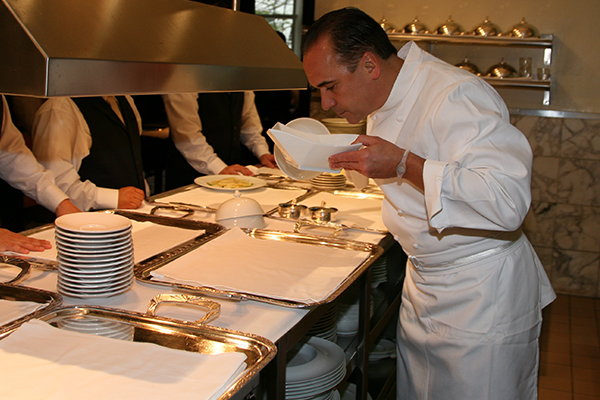
You might not think that David Gordon, M.D., and Marisha Pessl would have much in common, much less ”” judging from their easy banter and laughter over the phone ”” a successful marriage.
He is, after all, regional chair of neurosurgery for Northwell facilities in Westchester County, chief of neurosurgery at Phelps Hospital in Tarrytown and chair of neurosurgery at Northern Westchester Hospital in Mount Kisco. She is The New York Times best-selling author of the literary mystery/thrillers “Night Film,” “Special Topics in Calamity Physics” and “Neverworld Wake,” a young-adult novel, all of which have been published in more than 25 languages. Indeed, the very thought of a neurosurgeon and a novelist together sets up a twist on the old joke: “A neurosurgeon and a novelist walk into a bar”¦,” which sets them to cackling.
But as in Pessl”™s fiction, things are not all that they seem. At Brown University in Providence, Rhode Island, Gordon planned on being an English teacher “until I took the class ”˜Introduction to the Brain”™ and got hooked.” Still, he uses the communications skills honed in English to convey complex treatments and compassion to those facing dire diagnoses.
As for Pessl ”” who did major in English literature at Barnard College in Manhattan with a minor in playwriting after a stint studying film at Northwestern University in Evanston, Illinois ”” her first job out of college was as a financial consultant, of all things. “In 2000 and 2001, it was very easy to find a job telling financial stories,” she says of the PowerPoint presentations she wrote for PricewaterhouseCoopers, the multinational professional services giant. “My assignment was with JPMorgan Chase & Co., assisting with its merger in the private banking sector.”
Only she wasn”™t just assisting with that merger. She was exploring the bank”™s employee database to inspire names for the characters in what would be her first novel, “Special Topics in Calamity Physics.”
Now she has Google. Still, she says, “I miss the JPMorgan Chase database.”
So Gordon and Pessl are all about the brain ”” both the analytical and the creative sides of it ”” and its more poetic name, the mind. You could say they are the Shakespearean “marriage of true minds.”
It”™s not all they have in common. Start with three girls ”” 7, 5 and “2 going on 45,” Pressl says of their independent-minded third daughter. Then there”™s the house in Bedford Hills.
“It was kind of a whirlwind,” Pessl says of their 2020 exodus from New York City. “The pandemic accelerated everything. We said, ”˜Let”™s get this house.”™ It turned out to be our dream house.”
One in which she could replicate her pastoral childhood. “I grew up in Ashville, North Carolina, with lots of horseback riding. I wanted that kind of recreation for the kids.”
New York City, though, was her first love ”” you know, all those stories and movies about writers finding success and romance as they take Manhattan.
Gordon, too, fell in love with the city, moving there to train at the Albert Einstein College of Medicine in the Bronx after growing up in Cherry Hill, New Jersey ”” a suburb of Philadelphia ”” and attending Vanderbilt University School of Medicine in Nashville, Tennessee. He completed two fellowships, one in skull-base surgery at Roosevelt Hospital (now Mount Sinai West) in Manhattan and the other in endovascular neurosurgery at Thomas Jefferson University Hospitals in Philadelphia.
Throughout his career, which continued at Montefiore Medical Center in the Bronx and NYU Langone Health in Manhattan and Brooklyn, Gordon has helped refine innovative techniques for the treatment of cerebrovascular disease, including brain aneurysms, arteriovenous malformations (AVMs) and stroke. He specializes in open surgical and endovascular, catheter-based approaches to treat these conditions as well as in open and endoscopic skull-base surgery for tumors and vascular challenges.
“There are great advancements in catheter-based techniques,” he says, making an analogy to the treatment of heart disease. “Twenty, 30 years ago, it was still early, and you would have open-heart surgery. Today, the vast amount of procedures are catheterizations through the wrist or groin artery. We (in neurosurgery) have the equivalent.
“Skull-base surgery has made real advances, too,” he adds, “in which we can access the base of the skull through the nose with a camera.”
The results in both cases are less invasive procedures and better patient tolerance, he says.
In mapping the infrastructure to support the most complex brain procedures at Montefiore and Langone, Gordon was recruited to join Northwell in Westchester in 2020 and do the same.
By then, he had met Pessl through a matchmaker in the city, married her and begun having children. Clearly, “matchmaker, matchmaker” did her job.
Now the couple are ensconced in the suburbs, where he pursues the latest advances in neurosurgery and she prepares the sequel to “Night Film” and serves as executive producer and screenwriter on Amazon Studios”™ adaptation of the book.
When you”™re a Westchester power couple, there”™s always a next chapter.
For more, visit northwell.edu.





















